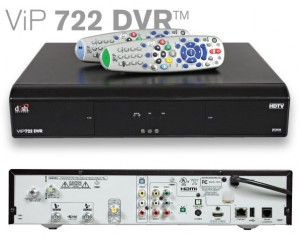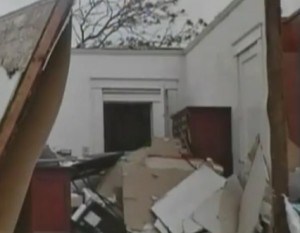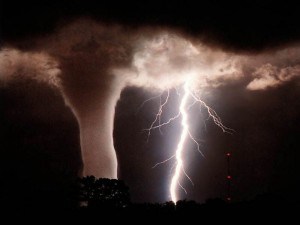
Dish Networks' ViP722: Leaving on a 60-watt bulb 24 hours a day uses just a tad more than the ludicrous power consumption of this set top box: 55W while active and 52W while in standby.
The average pay television subscriber is spending at least $4 a month in hidden electricity costs thanks to the small set top boxes found on top of many television sets across North America. That’s more than you are paying to run a modern refrigerator.
That stunning revelation comes from a study by the Natural Resources Defense Council, financed by the Environmental Protection Agency.
Costs for residents in the northeastern United States, where electricity rates are often higher, can reach $10 per month for customers with a DVR in the living room and a traditional set top box in the bedroom. That’s up to $120 a year in hidden charges.
The pay television industry, which has driven the set top box into millions of homes, has never paid much attention to energy consumption of their equipment, if only because they don’t pay the power bills of their customers. The NRDC found that many boxes even attempt to fool consumers into believing they are running in a reduced-power mode, by programming them to slightly dim the front clock when the box’s “power button” is switched off.
In reality, most set top boxes use nearly as much power “shut off” as they use left on.
The cost of these little power demons to North America’s power grid exceeds 18 billion kilowatt hours. More than seven power plants could not sustain that level of power, even if running 24/7 every day of the year. The combined electric use of Alberta and British Columbia in a year would still not match the power consumption of every set top box in North America.
These revelations have led the U.S. Department of Energy to lay the groundwork to regulate the power consumption of set top equipment. Once again, the United States would be a follower. Europe cracked down on excessive power consumption of electronic equipment years earlier. In the United Kingdom, for example, satellite providers include a box that can achieve a standby status that only consumes a handful of watts. The trade-off is that consumers have to wait up to 90 seconds for the box to re-boot every morning when the television is first switched on. Consumers have the ability to choose different power states as a menu option on the devices.
Some cable operators program their DVR boxes to spin down internal hard drives overnight, assuming no recording is scheduled at those times. But many of these initiatives were designed to spare the longevity of the hard drive, not reduce power consumption overall.
Popular Science dug through the data and uncovered the best reasonable options subscribers have for boxes that at least snort their way onto your monthly utility bill, as opposed to pigging out at the trough (your wallet):
 If You Have Comcast
If You Have Comcast
In terms of energy efficiency, Comcast comes out as the lesser of several evils, but not by much. Comcast’s most energy-efficient boxes tend to be slightly more efficient than their equivalents at Verizon, Time Warner, and the satellite companies, and they also offer more choices in terms of hardware. The NRDC’s data picks the Motorola DCH70 as the best standard-def box (sucking down 10W while active, and 10W while on standby), the Pace RNG110 as the best high-def box (13W active, 12W standby), and the Motorola DCX3400 as the best HD/DVR (29W active, 28W standby).
I spoke to a Comcast representative who told me that typically, the company installs whichever box they want, but that if you request a specific box that they have in stock, they’ll happily install that one for you. They won’t order you a box from elsewhere, and this kind of hardware rotates in and out of availability fairly quickly, but at least you might have the option to choose.
If You Have Verizon FiOS
Verizon’s most efficient boxes are just okay, while its least efficient are some of the worst of any surveyed. Even worse, Verizon gives the customer absolutely no option about which box they get–you can’t request a specific box at any point. That doesn’t matter too much for the non-DVR boxes, as the NRDC’s findings only turned up one standard-def and one high-def box, but there’s a big gap in efficiency between the company’s best and worst DVRs. The most efficient is Motorola’s QIP7216, at an unremarkably 29W active and 28W standby, but the older Motorola QIP6416 clocks in at a lousy 36W active and 35W standby.
If You Have Time Warner Cable
Time Warner has a smaller selection of set-top boxes than either Verizon or Comcast, with only one averagely (in)efficient DVR and one startlingly inefficient standard-def box. For a high-def, non-DVR box, the Cisco Explorer 4250HDC is the most efficient, at 19W active and 18W standby, but Time Warner told me that that’s an older box that might be tough to find. The Time Warner rep was (surprisingly, given the company’s lousy reputation here in New York) quite helpful, and offered to try to track down one of the 4250HDCs if that was what I wanted.
 If You Have DirecTV
If You Have DirecTV
Here we get to the satellite folks. DirecTV’s offerings are only slightly less efficient than Comcast’s or Verizon’s, with the (currently only) standard-def box coming in at 12W active, 9W standby, the best HD box (the DirecTV H24) at 16W active, 15W standby, and the best HD/DVR (the DirecTV HR24) at 31W active, 31W standby. The DVR is pretty lousy, efficiency-wise, but that’s nothing compared to the Dish Network’s craziness.
If You Have Dish Network
I don’t know what is happening inside the Dish Network’s DVRs. Given the energy usage, they might well be powering nuclear reactors. The “best” DVR Dish offers, the ViP922, uses 43W while active, and 40W while in standby–but the worst one, the ViP722, uses a ridiculous 55W while active and 52W while in standby.
If You Use Internet Video Streaming
Many are ditching traditional cable services for online services like Netflix and Hulu, and luckily, there are a whole bunch of gadgets that can play that content (and more) on a TV. They are also invariably more efficient than a cable box, to a startling degree. The Apple TV (reviewed here), which streams Netflix and plays music, movies, and TV from Apple’s iTunes store, uses a mere 3W while active and 0.5W while in standby. Roku‘s XR-HD, which streams Netflix, Hulu, Amazon Instant Video, and a whole bunch more, uses only 7W while active and another 7W while in standby. The Boxee Box, a curiously shaped media streamer that uses the open-source, ultra-powerful Boxee software, can play Netflix, stream video from other computers on its network, play media from a hard drive or thumb drive plugged into one of its USB ports, and stream from lots of apps (with Hulu hopefully to come soon). It was tested by an Ars Technica commenter whose measurements probably differ from the NRDC’s, but roughly estimates that it uses 13W while active and 13W while in standby.
[flv width=”640″ height=”388″]http://www.phillipdampier.com/video/CBC TV boxes guzzle power 6-27-11.flv[/flv]
CBC TV took a closer look at the pay television set top box: a real power guzzler. (2 minutes)


 Subscribe
Subscribe








